Unit 401005: Human Development and Life Transition Issues Essay
VerifiedAdded on 2022/10/17
|9
|2034
|48
Essay
AI Summary
This essay delves into the realm of human development, specifically focusing on psychosocial development during early childhood (ages 2-5). It examines the significance of psychosocial development in shaping a child's personality, drawing upon Erikson's stages of psychosocial development, particularly "Autonomy vs. Shame and Doubt" and "Initiative vs. Guilt," and Bandura's social-cognitive theory. The essay explores two key examples of psychosocial development: toileting habits and healthy eating habits, discussing how parental support, caregiver practices, and peer interactions influence these developmental milestones. It analyzes the impact of factors such as working parents, lack of encouragement, and the role of peers in fostering autonomy, independence, and self-esteem in toddlers. The essay emphasizes the importance of creating supportive environments in both home and childcare settings to facilitate these crucial developmental skills. Ultimately, the essay underscores the critical role of psychosocial development in shaping children into responsible adults, highlighting the interplay of biological, social, and environmental factors.
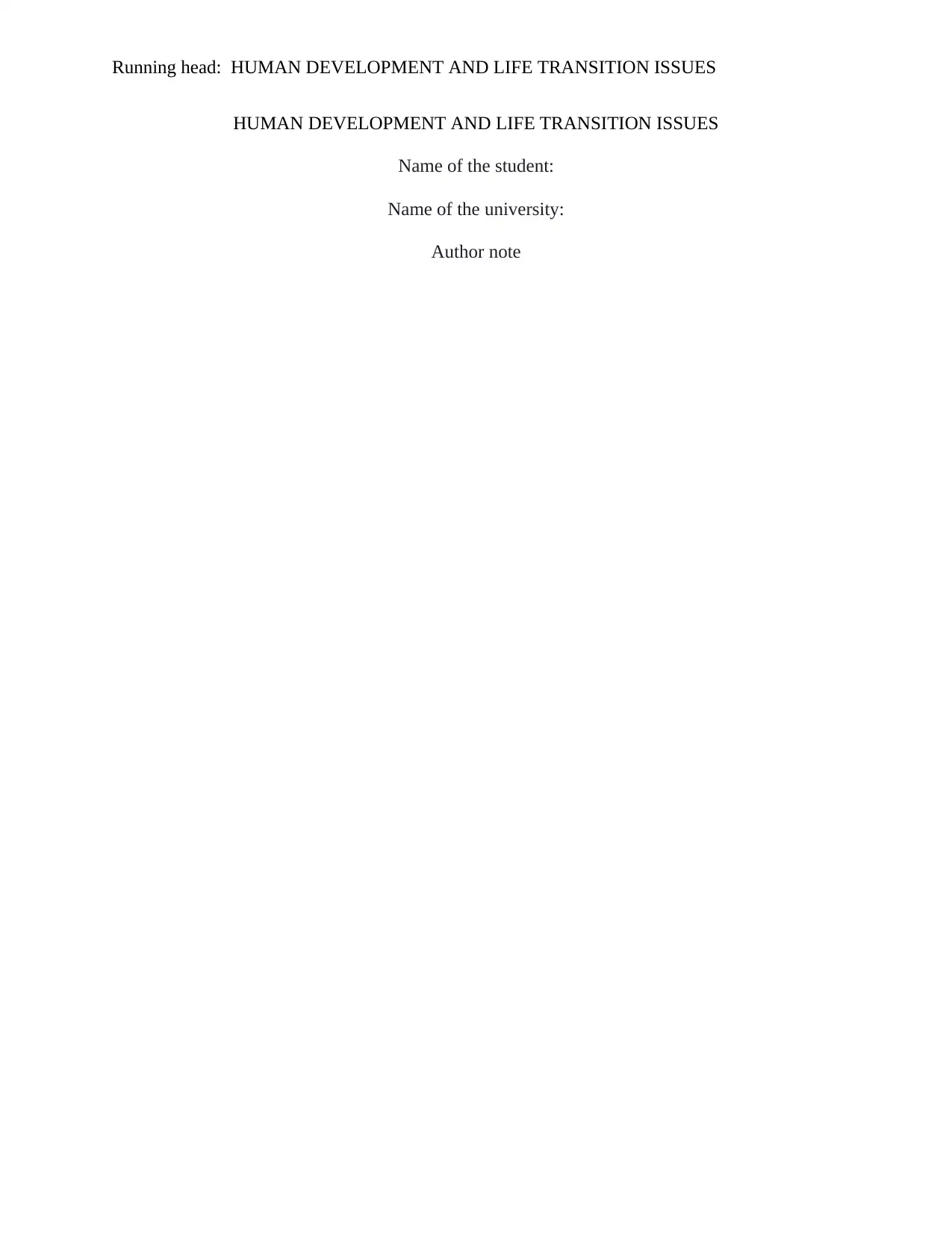
Running head: HUMAN DEVELOPMENT AND LIFE TRANSITION ISSUES
HUMAN DEVELOPMENT AND LIFE TRANSITION ISSUES
Name of the student:
Name of the university:
Author note
HUMAN DEVELOPMENT AND LIFE TRANSITION ISSUES
Name of the student:
Name of the university:
Author note
Paraphrase This Document
Need a fresh take? Get an instant paraphrase of this document with our AI Paraphraser
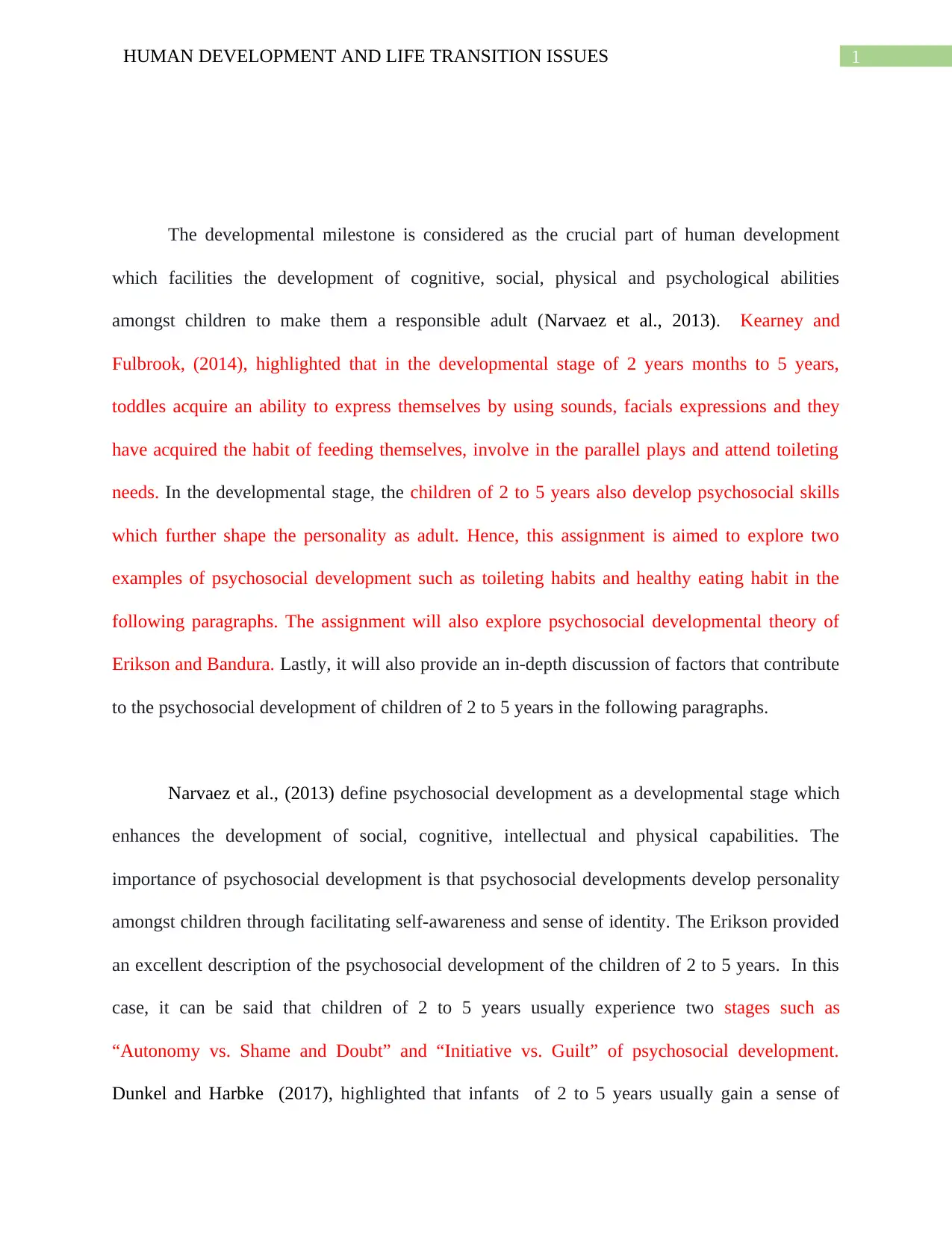
1HUMAN DEVELOPMENT AND LIFE TRANSITION ISSUES
The developmental milestone is considered as the crucial part of human development
which facilities the development of cognitive, social, physical and psychological abilities
amongst children to make them a responsible adult (Narvaez et al., 2013). Kearney and
Fulbrook, (2014), highlighted that in the developmental stage of 2 years months to 5 years,
toddles acquire an ability to express themselves by using sounds, facials expressions and they
have acquired the habit of feeding themselves, involve in the parallel plays and attend toileting
needs. In the developmental stage, the children of 2 to 5 years also develop psychosocial skills
which further shape the personality as adult. Hence, this assignment is aimed to explore two
examples of psychosocial development such as toileting habits and healthy eating habit in the
following paragraphs. The assignment will also explore psychosocial developmental theory of
Erikson and Bandura. Lastly, it will also provide an in-depth discussion of factors that contribute
to the psychosocial development of children of 2 to 5 years in the following paragraphs.
Narvaez et al., (2013) define psychosocial development as a developmental stage which
enhances the development of social, cognitive, intellectual and physical capabilities. The
importance of psychosocial development is that psychosocial developments develop personality
amongst children through facilitating self-awareness and sense of identity. The Erikson provided
an excellent description of the psychosocial development of the children of 2 to 5 years. In this
case, it can be said that children of 2 to 5 years usually experience two stages such as
“Autonomy vs. Shame and Doubt” and “Initiative vs. Guilt” of psychosocial development.
Dunkel and Harbke (2017), highlighted that infants of 2 to 5 years usually gain a sense of
The developmental milestone is considered as the crucial part of human development
which facilities the development of cognitive, social, physical and psychological abilities
amongst children to make them a responsible adult (Narvaez et al., 2013). Kearney and
Fulbrook, (2014), highlighted that in the developmental stage of 2 years months to 5 years,
toddles acquire an ability to express themselves by using sounds, facials expressions and they
have acquired the habit of feeding themselves, involve in the parallel plays and attend toileting
needs. In the developmental stage, the children of 2 to 5 years also develop psychosocial skills
which further shape the personality as adult. Hence, this assignment is aimed to explore two
examples of psychosocial development such as toileting habits and healthy eating habit in the
following paragraphs. The assignment will also explore psychosocial developmental theory of
Erikson and Bandura. Lastly, it will also provide an in-depth discussion of factors that contribute
to the psychosocial development of children of 2 to 5 years in the following paragraphs.
Narvaez et al., (2013) define psychosocial development as a developmental stage which
enhances the development of social, cognitive, intellectual and physical capabilities. The
importance of psychosocial development is that psychosocial developments develop personality
amongst children through facilitating self-awareness and sense of identity. The Erikson provided
an excellent description of the psychosocial development of the children of 2 to 5 years. In this
case, it can be said that children of 2 to 5 years usually experience two stages such as
“Autonomy vs. Shame and Doubt” and “Initiative vs. Guilt” of psychosocial development.
Dunkel and Harbke (2017), highlighted that infants of 2 to 5 years usually gain a sense of
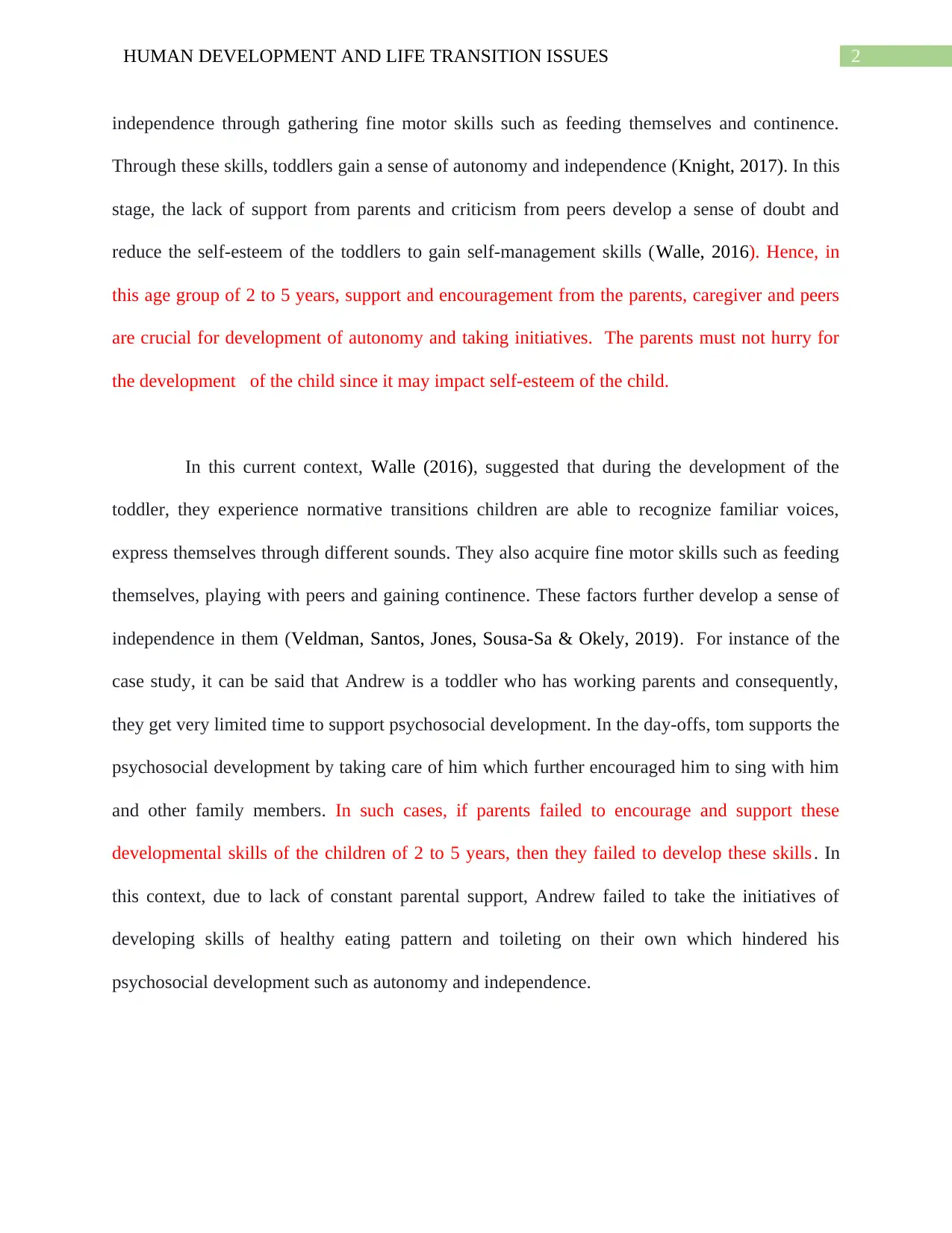
2HUMAN DEVELOPMENT AND LIFE TRANSITION ISSUES
independence through gathering fine motor skills such as feeding themselves and continence.
Through these skills, toddlers gain a sense of autonomy and independence (Knight, 2017). In this
stage, the lack of support from parents and criticism from peers develop a sense of doubt and
reduce the self-esteem of the toddlers to gain self-management skills (Walle, 2016). Hence, in
this age group of 2 to 5 years, support and encouragement from the parents, caregiver and peers
are crucial for development of autonomy and taking initiatives. The parents must not hurry for
the development of the child since it may impact self-esteem of the child.
In this current context, Walle (2016), suggested that during the development of the
toddler, they experience normative transitions children are able to recognize familiar voices,
express themselves through different sounds. They also acquire fine motor skills such as feeding
themselves, playing with peers and gaining continence. These factors further develop a sense of
independence in them (Veldman, Santos, Jones, Sousa-Sa & Okely, 2019). For instance of the
case study, it can be said that Andrew is a toddler who has working parents and consequently,
they get very limited time to support psychosocial development. In the day-offs, tom supports the
psychosocial development by taking care of him which further encouraged him to sing with him
and other family members. In such cases, if parents failed to encourage and support these
developmental skills of the children of 2 to 5 years, then they failed to develop these skills. In
this context, due to lack of constant parental support, Andrew failed to take the initiatives of
developing skills of healthy eating pattern and toileting on their own which hindered his
psychosocial development such as autonomy and independence.
independence through gathering fine motor skills such as feeding themselves and continence.
Through these skills, toddlers gain a sense of autonomy and independence (Knight, 2017). In this
stage, the lack of support from parents and criticism from peers develop a sense of doubt and
reduce the self-esteem of the toddlers to gain self-management skills (Walle, 2016). Hence, in
this age group of 2 to 5 years, support and encouragement from the parents, caregiver and peers
are crucial for development of autonomy and taking initiatives. The parents must not hurry for
the development of the child since it may impact self-esteem of the child.
In this current context, Walle (2016), suggested that during the development of the
toddler, they experience normative transitions children are able to recognize familiar voices,
express themselves through different sounds. They also acquire fine motor skills such as feeding
themselves, playing with peers and gaining continence. These factors further develop a sense of
independence in them (Veldman, Santos, Jones, Sousa-Sa & Okely, 2019). For instance of the
case study, it can be said that Andrew is a toddler who has working parents and consequently,
they get very limited time to support psychosocial development. In the day-offs, tom supports the
psychosocial development by taking care of him which further encouraged him to sing with him
and other family members. In such cases, if parents failed to encourage and support these
developmental skills of the children of 2 to 5 years, then they failed to develop these skills. In
this context, due to lack of constant parental support, Andrew failed to take the initiatives of
developing skills of healthy eating pattern and toileting on their own which hindered his
psychosocial development such as autonomy and independence.
⊘ This is a preview!⊘
Do you want full access?
Subscribe today to unlock all pages.

Trusted by 1+ million students worldwide
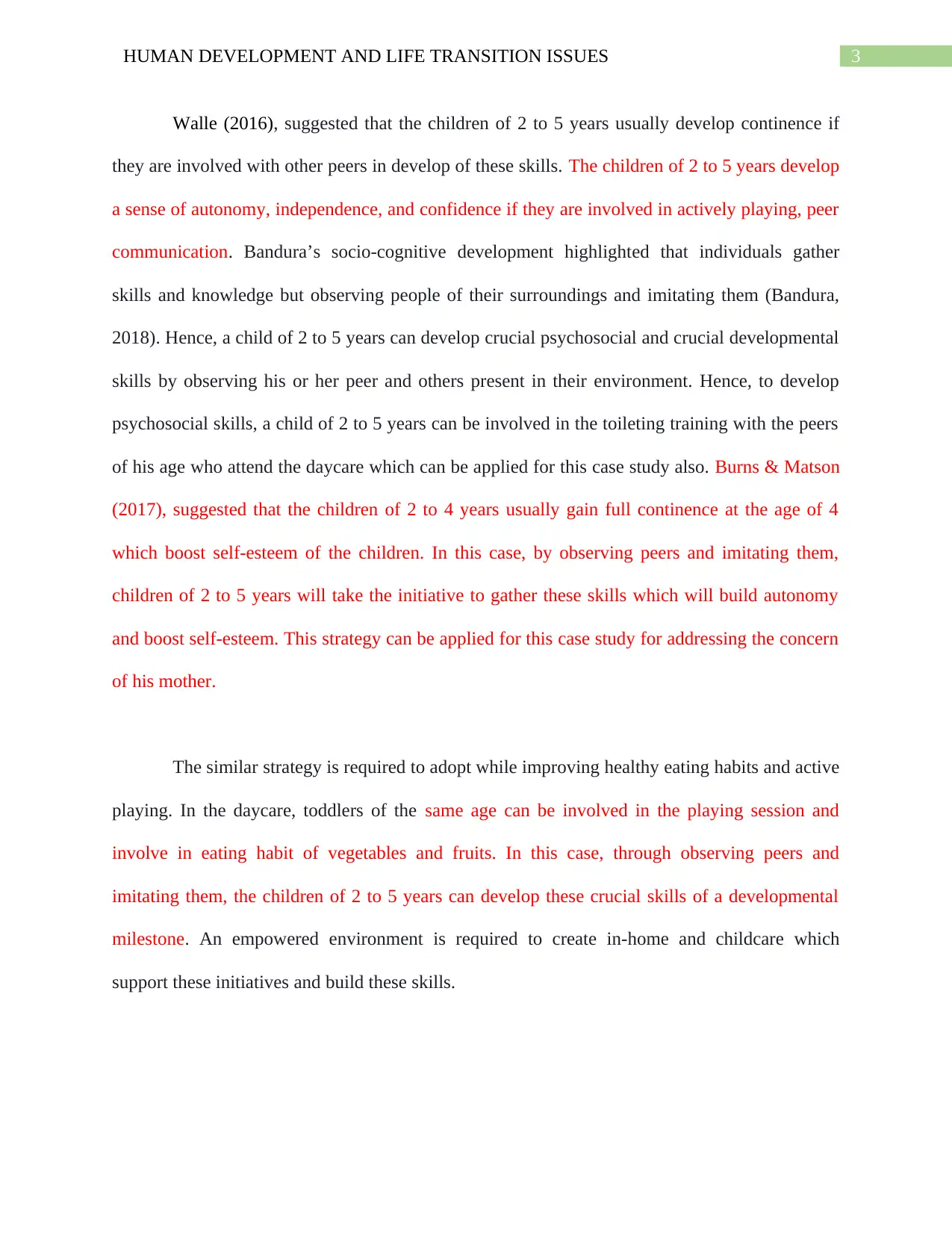
3HUMAN DEVELOPMENT AND LIFE TRANSITION ISSUES
Walle (2016), suggested that the children of 2 to 5 years usually develop continence if
they are involved with other peers in develop of these skills. The children of 2 to 5 years develop
a sense of autonomy, independence, and confidence if they are involved in actively playing, peer
communication. Bandura’s socio-cognitive development highlighted that individuals gather
skills and knowledge but observing people of their surroundings and imitating them (Bandura,
2018). Hence, a child of 2 to 5 years can develop crucial psychosocial and crucial developmental
skills by observing his or her peer and others present in their environment. Hence, to develop
psychosocial skills, a child of 2 to 5 years can be involved in the toileting training with the peers
of his age who attend the daycare which can be applied for this case study also. Burns & Matson
(2017), suggested that the children of 2 to 4 years usually gain full continence at the age of 4
which boost self-esteem of the children. In this case, by observing peers and imitating them,
children of 2 to 5 years will take the initiative to gather these skills which will build autonomy
and boost self-esteem. This strategy can be applied for this case study for addressing the concern
of his mother.
The similar strategy is required to adopt while improving healthy eating habits and active
playing. In the daycare, toddlers of the same age can be involved in the playing session and
involve in eating habit of vegetables and fruits. In this case, through observing peers and
imitating them, the children of 2 to 5 years can develop these crucial skills of a developmental
milestone. An empowered environment is required to create in-home and childcare which
support these initiatives and build these skills.
Walle (2016), suggested that the children of 2 to 5 years usually develop continence if
they are involved with other peers in develop of these skills. The children of 2 to 5 years develop
a sense of autonomy, independence, and confidence if they are involved in actively playing, peer
communication. Bandura’s socio-cognitive development highlighted that individuals gather
skills and knowledge but observing people of their surroundings and imitating them (Bandura,
2018). Hence, a child of 2 to 5 years can develop crucial psychosocial and crucial developmental
skills by observing his or her peer and others present in their environment. Hence, to develop
psychosocial skills, a child of 2 to 5 years can be involved in the toileting training with the peers
of his age who attend the daycare which can be applied for this case study also. Burns & Matson
(2017), suggested that the children of 2 to 4 years usually gain full continence at the age of 4
which boost self-esteem of the children. In this case, by observing peers and imitating them,
children of 2 to 5 years will take the initiative to gather these skills which will build autonomy
and boost self-esteem. This strategy can be applied for this case study for addressing the concern
of his mother.
The similar strategy is required to adopt while improving healthy eating habits and active
playing. In the daycare, toddlers of the same age can be involved in the playing session and
involve in eating habit of vegetables and fruits. In this case, through observing peers and
imitating them, the children of 2 to 5 years can develop these crucial skills of a developmental
milestone. An empowered environment is required to create in-home and childcare which
support these initiatives and build these skills.
Paraphrase This Document
Need a fresh take? Get an instant paraphrase of this document with our AI Paraphraser
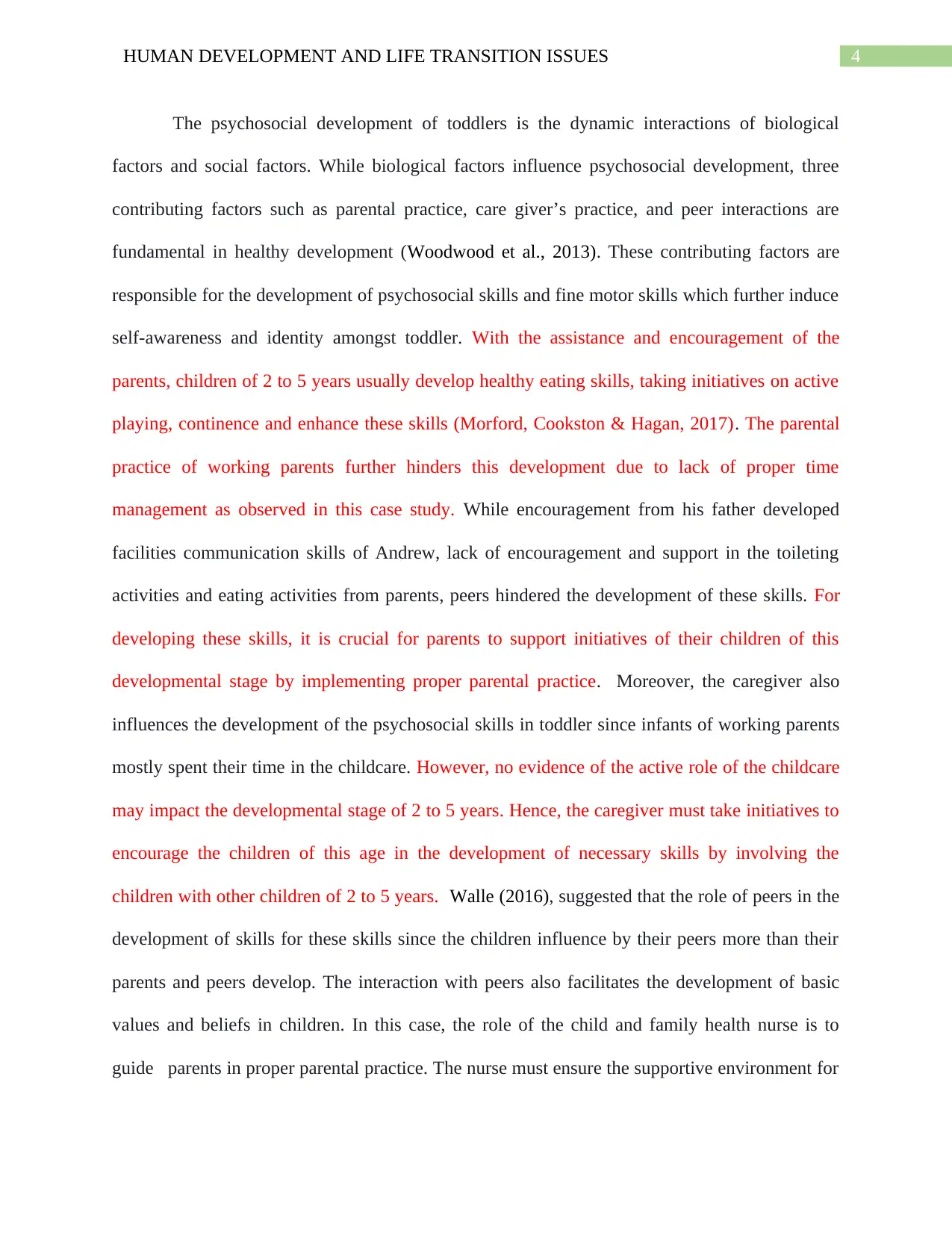
4HUMAN DEVELOPMENT AND LIFE TRANSITION ISSUES
The psychosocial development of toddlers is the dynamic interactions of biological
factors and social factors. While biological factors influence psychosocial development, three
contributing factors such as parental practice, care giver’s practice, and peer interactions are
fundamental in healthy development (Woodwood et al., 2013). These contributing factors are
responsible for the development of psychosocial skills and fine motor skills which further induce
self-awareness and identity amongst toddler. With the assistance and encouragement of the
parents, children of 2 to 5 years usually develop healthy eating skills, taking initiatives on active
playing, continence and enhance these skills (Morford, Cookston & Hagan, 2017). The parental
practice of working parents further hinders this development due to lack of proper time
management as observed in this case study. While encouragement from his father developed
facilities communication skills of Andrew, lack of encouragement and support in the toileting
activities and eating activities from parents, peers hindered the development of these skills. For
developing these skills, it is crucial for parents to support initiatives of their children of this
developmental stage by implementing proper parental practice. Moreover, the caregiver also
influences the development of the psychosocial skills in toddler since infants of working parents
mostly spent their time in the childcare. However, no evidence of the active role of the childcare
may impact the developmental stage of 2 to 5 years. Hence, the caregiver must take initiatives to
encourage the children of this age in the development of necessary skills by involving the
children with other children of 2 to 5 years. Walle (2016), suggested that the role of peers in the
development of skills for these skills since the children influence by their peers more than their
parents and peers develop. The interaction with peers also facilitates the development of basic
values and beliefs in children. In this case, the role of the child and family health nurse is to
guide parents in proper parental practice. The nurse must ensure the supportive environment for
The psychosocial development of toddlers is the dynamic interactions of biological
factors and social factors. While biological factors influence psychosocial development, three
contributing factors such as parental practice, care giver’s practice, and peer interactions are
fundamental in healthy development (Woodwood et al., 2013). These contributing factors are
responsible for the development of psychosocial skills and fine motor skills which further induce
self-awareness and identity amongst toddler. With the assistance and encouragement of the
parents, children of 2 to 5 years usually develop healthy eating skills, taking initiatives on active
playing, continence and enhance these skills (Morford, Cookston & Hagan, 2017). The parental
practice of working parents further hinders this development due to lack of proper time
management as observed in this case study. While encouragement from his father developed
facilities communication skills of Andrew, lack of encouragement and support in the toileting
activities and eating activities from parents, peers hindered the development of these skills. For
developing these skills, it is crucial for parents to support initiatives of their children of this
developmental stage by implementing proper parental practice. Moreover, the caregiver also
influences the development of the psychosocial skills in toddler since infants of working parents
mostly spent their time in the childcare. However, no evidence of the active role of the childcare
may impact the developmental stage of 2 to 5 years. Hence, the caregiver must take initiatives to
encourage the children of this age in the development of necessary skills by involving the
children with other children of 2 to 5 years. Walle (2016), suggested that the role of peers in the
development of skills for these skills since the children influence by their peers more than their
parents and peers develop. The interaction with peers also facilitates the development of basic
values and beliefs in children. In this case, the role of the child and family health nurse is to
guide parents in proper parental practice. The nurse must ensure the supportive environment for
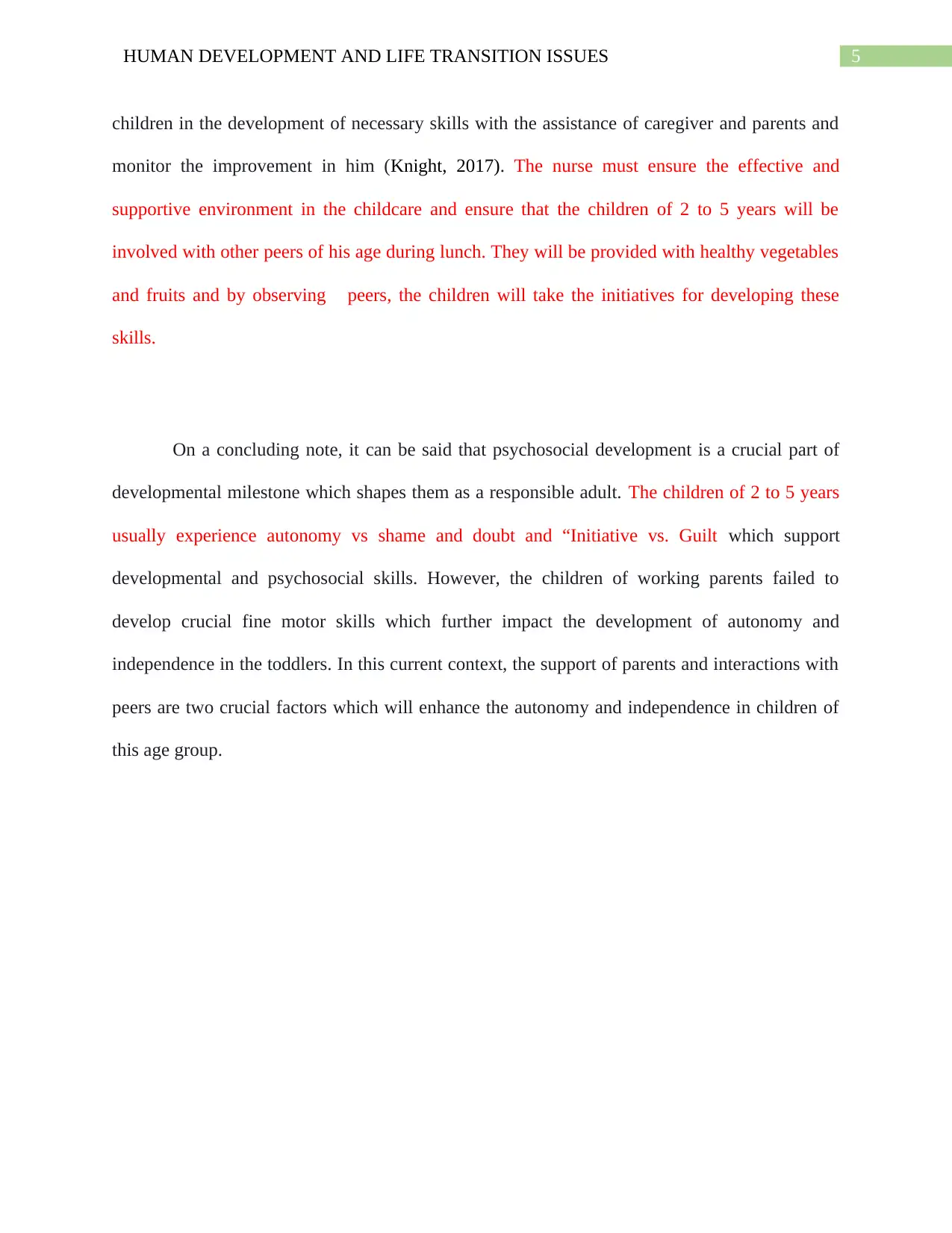
5HUMAN DEVELOPMENT AND LIFE TRANSITION ISSUES
children in the development of necessary skills with the assistance of caregiver and parents and
monitor the improvement in him (Knight, 2017). The nurse must ensure the effective and
supportive environment in the childcare and ensure that the children of 2 to 5 years will be
involved with other peers of his age during lunch. They will be provided with healthy vegetables
and fruits and by observing peers, the children will take the initiatives for developing these
skills.
On a concluding note, it can be said that psychosocial development is a crucial part of
developmental milestone which shapes them as a responsible adult. The children of 2 to 5 years
usually experience autonomy vs shame and doubt and “Initiative vs. Guilt which support
developmental and psychosocial skills. However, the children of working parents failed to
develop crucial fine motor skills which further impact the development of autonomy and
independence in the toddlers. In this current context, the support of parents and interactions with
peers are two crucial factors which will enhance the autonomy and independence in children of
this age group.
children in the development of necessary skills with the assistance of caregiver and parents and
monitor the improvement in him (Knight, 2017). The nurse must ensure the effective and
supportive environment in the childcare and ensure that the children of 2 to 5 years will be
involved with other peers of his age during lunch. They will be provided with healthy vegetables
and fruits and by observing peers, the children will take the initiatives for developing these
skills.
On a concluding note, it can be said that psychosocial development is a crucial part of
developmental milestone which shapes them as a responsible adult. The children of 2 to 5 years
usually experience autonomy vs shame and doubt and “Initiative vs. Guilt which support
developmental and psychosocial skills. However, the children of working parents failed to
develop crucial fine motor skills which further impact the development of autonomy and
independence in the toddlers. In this current context, the support of parents and interactions with
peers are two crucial factors which will enhance the autonomy and independence in children of
this age group.
⊘ This is a preview!⊘
Do you want full access?
Subscribe today to unlock all pages.

Trusted by 1+ million students worldwide
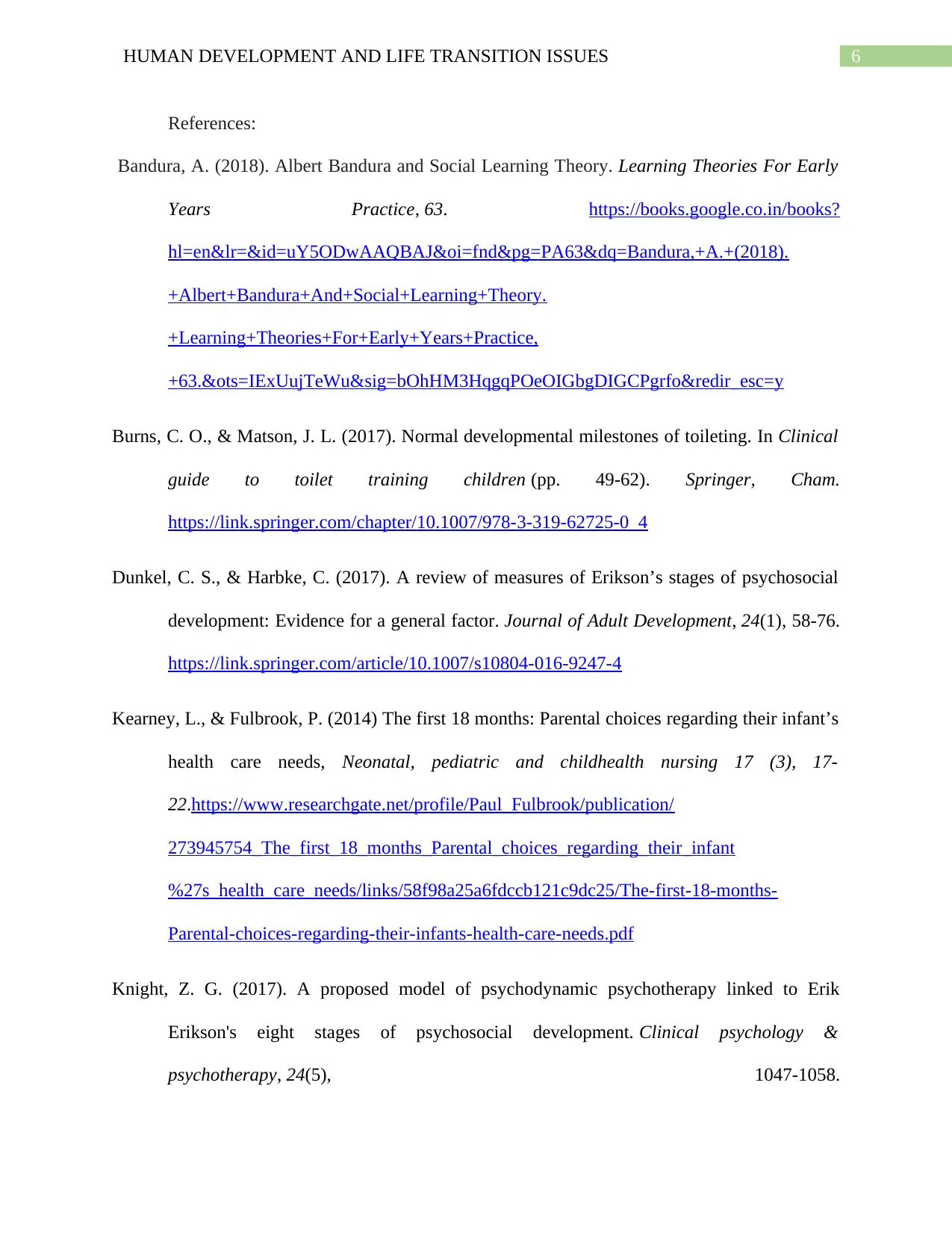
6HUMAN DEVELOPMENT AND LIFE TRANSITION ISSUES
References:
Bandura, A. (2018). Albert Bandura and Social Learning Theory. Learning Theories For Early
Years Practice, 63. https://books.google.co.in/books?
hl=en&lr=&id=uY5ODwAAQBAJ&oi=fnd&pg=PA63&dq=Bandura,+A.+(2018).
+Albert+Bandura+And+Social+Learning+Theory.
+Learning+Theories+For+Early+Years+Practice,
+63.&ots=IExUujTeWu&sig=bOhHM3HqgqPOeOIGbgDIGCPgrfo&redir_esc=y
Burns, C. O., & Matson, J. L. (2017). Normal developmental milestones of toileting. In Clinical
guide to toilet training children (pp. 49-62). Springer, Cham.
https://link.springer.com/chapter/10.1007/978-3-319-62725-0_4
Dunkel, C. S., & Harbke, C. (2017). A review of measures of Erikson’s stages of psychosocial
development: Evidence for a general factor. Journal of Adult Development, 24(1), 58-76.
https://link.springer.com/article/10.1007/s10804-016-9247-4
Kearney, L., & Fulbrook, P. (2014) The first 18 months: Parental choices regarding their infant’s
health care needs, Neonatal, pediatric and childhealth nursing 17 (3), 17-
22.https://www.researchgate.net/profile/Paul_Fulbrook/publication/
273945754_The_first_18_months_Parental_choices_regarding_their_infant
%27s_health_care_needs/links/58f98a25a6fdccb121c9dc25/The-first-18-months-
Parental-choices-regarding-their-infants-health-care-needs.pdf
Knight, Z. G. (2017). A proposed model of psychodynamic psychotherapy linked to Erik
Erikson's eight stages of psychosocial development. Clinical psychology &
psychotherapy, 24(5), 1047-1058.
References:
Bandura, A. (2018). Albert Bandura and Social Learning Theory. Learning Theories For Early
Years Practice, 63. https://books.google.co.in/books?
hl=en&lr=&id=uY5ODwAAQBAJ&oi=fnd&pg=PA63&dq=Bandura,+A.+(2018).
+Albert+Bandura+And+Social+Learning+Theory.
+Learning+Theories+For+Early+Years+Practice,
+63.&ots=IExUujTeWu&sig=bOhHM3HqgqPOeOIGbgDIGCPgrfo&redir_esc=y
Burns, C. O., & Matson, J. L. (2017). Normal developmental milestones of toileting. In Clinical
guide to toilet training children (pp. 49-62). Springer, Cham.
https://link.springer.com/chapter/10.1007/978-3-319-62725-0_4
Dunkel, C. S., & Harbke, C. (2017). A review of measures of Erikson’s stages of psychosocial
development: Evidence for a general factor. Journal of Adult Development, 24(1), 58-76.
https://link.springer.com/article/10.1007/s10804-016-9247-4
Kearney, L., & Fulbrook, P. (2014) The first 18 months: Parental choices regarding their infant’s
health care needs, Neonatal, pediatric and childhealth nursing 17 (3), 17-
22.https://www.researchgate.net/profile/Paul_Fulbrook/publication/
273945754_The_first_18_months_Parental_choices_regarding_their_infant
%27s_health_care_needs/links/58f98a25a6fdccb121c9dc25/The-first-18-months-
Parental-choices-regarding-their-infants-health-care-needs.pdf
Knight, Z. G. (2017). A proposed model of psychodynamic psychotherapy linked to Erik
Erikson's eight stages of psychosocial development. Clinical psychology &
psychotherapy, 24(5), 1047-1058.
Paraphrase This Document
Need a fresh take? Get an instant paraphrase of this document with our AI Paraphraser
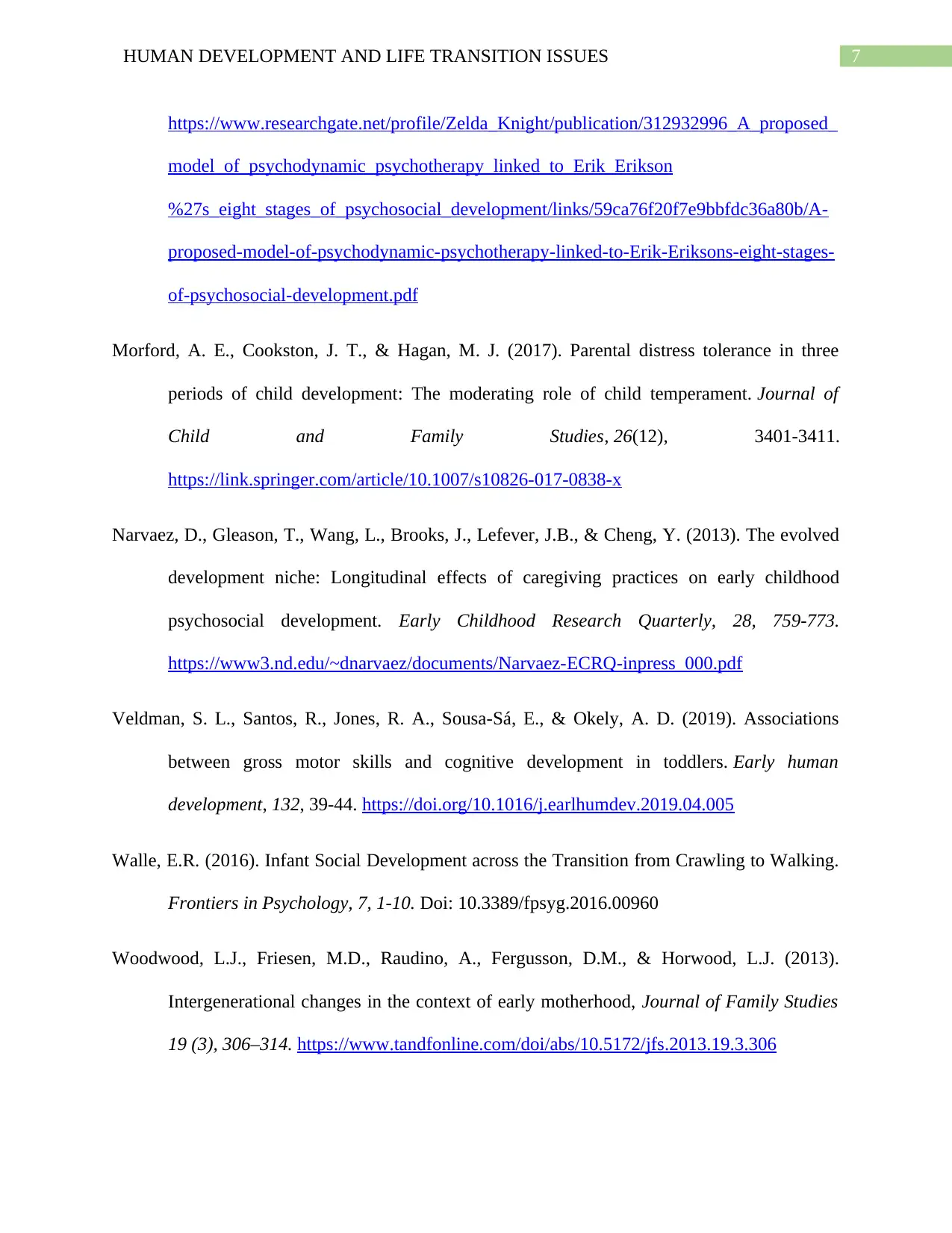
7HUMAN DEVELOPMENT AND LIFE TRANSITION ISSUES
https://www.researchgate.net/profile/Zelda_Knight/publication/312932996_A_proposed_
model_of_psychodynamic_psychotherapy_linked_to_Erik_Erikson
%27s_eight_stages_of_psychosocial_development/links/59ca76f20f7e9bbfdc36a80b/A-
proposed-model-of-psychodynamic-psychotherapy-linked-to-Erik-Eriksons-eight-stages-
of-psychosocial-development.pdf
Morford, A. E., Cookston, J. T., & Hagan, M. J. (2017). Parental distress tolerance in three
periods of child development: The moderating role of child temperament. Journal of
Child and Family Studies, 26(12), 3401-3411.
https://link.springer.com/article/10.1007/s10826-017-0838-x
Narvaez, D., Gleason, T., Wang, L., Brooks, J., Lefever, J.B., & Cheng, Y. (2013). The evolved
development niche: Longitudinal effects of caregiving practices on early childhood
psychosocial development. Early Childhood Research Quarterly, 28, 759-773.
https://www3.nd.edu/~dnarvaez/documents/Narvaez-ECRQ-inpress_000.pdf
Veldman, S. L., Santos, R., Jones, R. A., Sousa-Sá, E., & Okely, A. D. (2019). Associations
between gross motor skills and cognitive development in toddlers. Early human
development, 132, 39-44. https://doi.org/10.1016/j.earlhumdev.2019.04.005
Walle, E.R. (2016). Infant Social Development across the Transition from Crawling to Walking.
Frontiers in Psychology, 7, 1-10. Doi: 10.3389/fpsyg.2016.00960
Woodwood, L.J., Friesen, M.D., Raudino, A., Fergusson, D.M., & Horwood, L.J. (2013).
Intergenerational changes in the context of early motherhood, Journal of Family Studies
19 (3), 306–314. https://www.tandfonline.com/doi/abs/10.5172/jfs.2013.19.3.306
https://www.researchgate.net/profile/Zelda_Knight/publication/312932996_A_proposed_
model_of_psychodynamic_psychotherapy_linked_to_Erik_Erikson
%27s_eight_stages_of_psychosocial_development/links/59ca76f20f7e9bbfdc36a80b/A-
proposed-model-of-psychodynamic-psychotherapy-linked-to-Erik-Eriksons-eight-stages-
of-psychosocial-development.pdf
Morford, A. E., Cookston, J. T., & Hagan, M. J. (2017). Parental distress tolerance in three
periods of child development: The moderating role of child temperament. Journal of
Child and Family Studies, 26(12), 3401-3411.
https://link.springer.com/article/10.1007/s10826-017-0838-x
Narvaez, D., Gleason, T., Wang, L., Brooks, J., Lefever, J.B., & Cheng, Y. (2013). The evolved
development niche: Longitudinal effects of caregiving practices on early childhood
psychosocial development. Early Childhood Research Quarterly, 28, 759-773.
https://www3.nd.edu/~dnarvaez/documents/Narvaez-ECRQ-inpress_000.pdf
Veldman, S. L., Santos, R., Jones, R. A., Sousa-Sá, E., & Okely, A. D. (2019). Associations
between gross motor skills and cognitive development in toddlers. Early human
development, 132, 39-44. https://doi.org/10.1016/j.earlhumdev.2019.04.005
Walle, E.R. (2016). Infant Social Development across the Transition from Crawling to Walking.
Frontiers in Psychology, 7, 1-10. Doi: 10.3389/fpsyg.2016.00960
Woodwood, L.J., Friesen, M.D., Raudino, A., Fergusson, D.M., & Horwood, L.J. (2013).
Intergenerational changes in the context of early motherhood, Journal of Family Studies
19 (3), 306–314. https://www.tandfonline.com/doi/abs/10.5172/jfs.2013.19.3.306
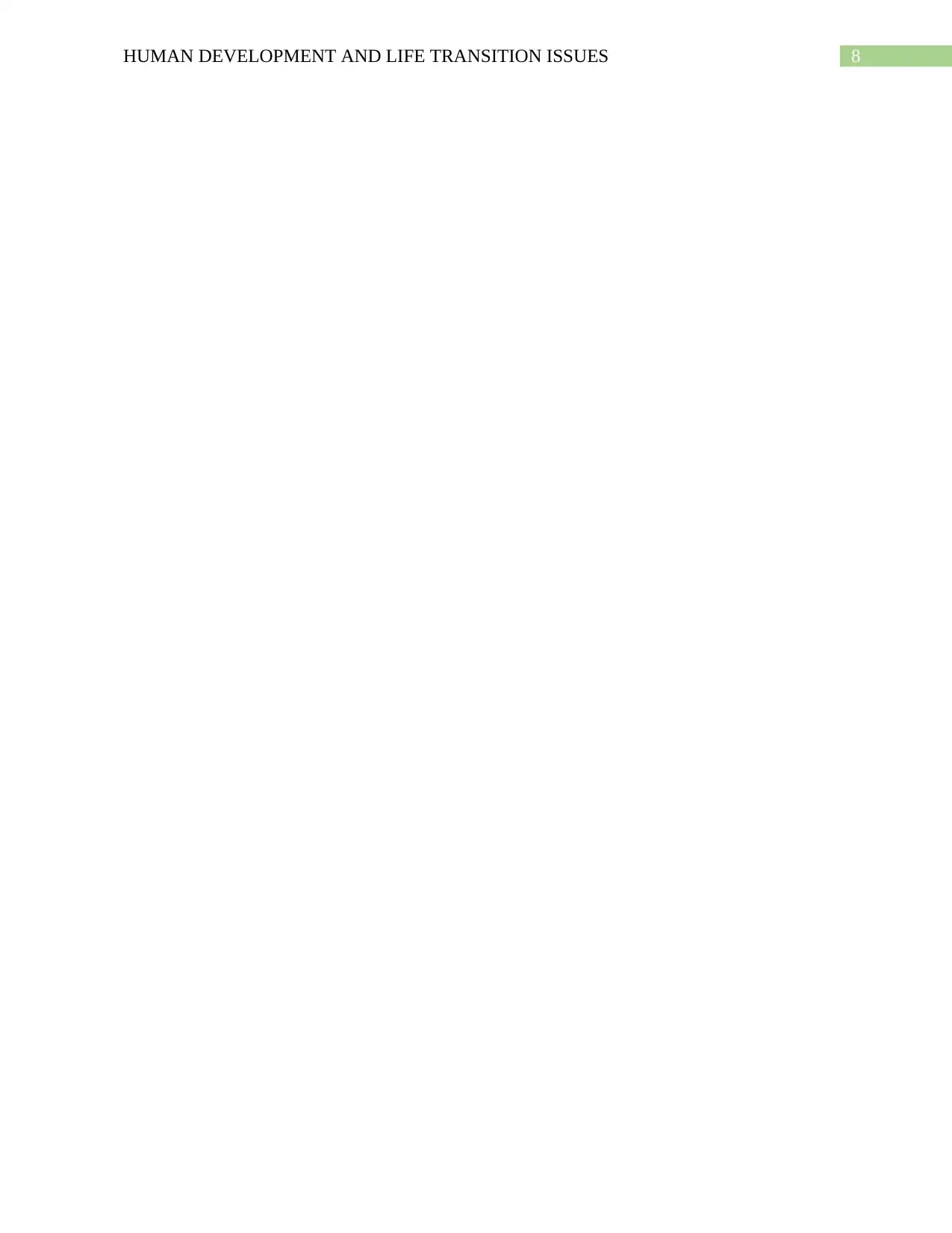
8HUMAN DEVELOPMENT AND LIFE TRANSITION ISSUES
⊘ This is a preview!⊘
Do you want full access?
Subscribe today to unlock all pages.

Trusted by 1+ million students worldwide
1 out of 9
Related Documents
Your All-in-One AI-Powered Toolkit for Academic Success.
+13062052269
info@desklib.com
Available 24*7 on WhatsApp / Email
![[object Object]](/_next/static/media/star-bottom.7253800d.svg)
Unlock your academic potential
Copyright © 2020–2026 A2Z Services. All Rights Reserved. Developed and managed by ZUCOL.





